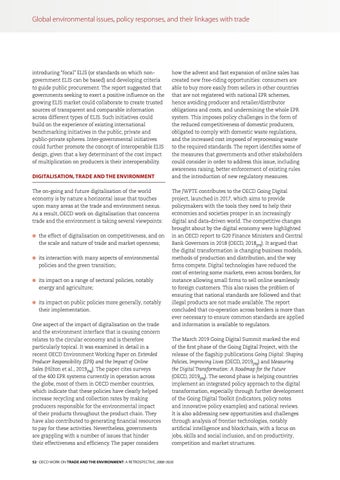Global environmental issues, policy responses, and their linkages with trade
introducing “focal” ELIS (or standards on which nongovernment ELIS can be based) and developing criteria to guide public procurement. The report suggested that governments seeking to exert a positive influence on the growing ELIS market could collaborate to create trusted sources of transparent and comparable information across different types of ELIS. Such initiatives could build on the experience of existing international benchmarking initiatives in the public, private and public-private spheres. Inter-governmental initiatives could further promote the concept of interoperable ELIS design, given that a key determinant of the cost impact of multiplication on producers is their interoperability.
DIGITALISATION, TRADE AND THE ENVIRONMENT The on-going and future digitalisation of the world economy is by nature a horizontal issue that touches upon many areas at the trade and environment nexus. As a result, OECD work on digitalisation that concerns trade and the environment is taking several viewpoints: l the effect of digitalisation on competitiveness, and on
the scale and nature of trade and market openness; l its interaction with many aspects of environmental
policies and the green transition; l its impact on a range of sectoral policies, notably
energy and agriculture; l its impact on public policies more generally, notably
their implementation. One aspect of the impact of digitalisation on the trade and the environment interface that is causing concern relates to the circular economy and is therefore particularly topical. It was examined in detail in a recent OECD Environment Working Paper on Extended Producer Responsibility (EPR) and the Impact of Online Sales (Hilton et al., 2019[76]). The paper cites surveys of the 400 EPR systems currently in operation across the globe, most of them in OECD member countries, which indicate that these policies have clearly helped increase recycling and collection rates by making producers responsible for the environmental impact of their products throughout the product chain. They have also contributed to generating financial resources to pay for these activities. Nevertheless, governments are grappling with a number of issues that hinder their effectiveness and efficiency. The paper considers
how the advent and fast expansion of online sales has created new free-riding opportunities: consumers are able to buy more easily from sellers in other countries that are not registered with national EPR schemes, hence avoiding producer and retailer/distributor obligations and costs, and undermining the whole EPR system. This imposes policy challenges in the form of the reduced competitiveness of domestic producers, obligated to comply with domestic waste regulations, and the increased cost imposed of reprocessing waste to the required standards. The report identifies some of the measures that governments and other stakeholders could consider in order to address this issue, including awareness raising, better enforcement of existing rules and the introduction of new regulatory measures. The JWPTE contributes to the OECD Going Digital project, launched in 2017, which aims to provide policymakers with the tools they need to help their economies and societies prosper in an increasingly digital and data-driven world. The competitive changes brought about by the digital economy were highlighted in an OECD report to G20 Finance Ministers and Central Bank Governors in 2018 (OECD, 2018[77]). It argued that the digital transformation is changing business models, methods of production and distribution, and the way firms compete. Digital technologies have reduced the cost of entering some markets, even across borders, for instance allowing small firms to sell online seamlessly to foreign customers. This also raises the problem of ensuring that national standards are followed and that illegal products are not made available. The report concluded that co-operation across borders is more than ever necessary to ensure common standards are applied and information is available to regulators. The March 2019 Going Digital Summit marked the end of the first phase of the Going Digital Project, with the release of the flagship publications Going Digital: Shaping Policies, Improving Lives (OECD, 2019[78]) and Measuring the Digital Transformation: A Roadmap for the Future (OECD, 2019[79]). The second phase is helping countries implement an integrated policy approach to the digital transformation, especially through further development of the Going Digital Toolkit (indicators, policy notes and innovative policy examples) and national reviews. It is also addressing new opportunities and challenges through analysis of frontier technologies, notably artificial intelligence and blockchain, with a focus on jobs, skills and social inclusion, and on productivity, competition and market structures.
52 . OECD WORK ON TRADE AND THE ENVIRONMENT: A RETROSPECTIVE, 2008-2020









